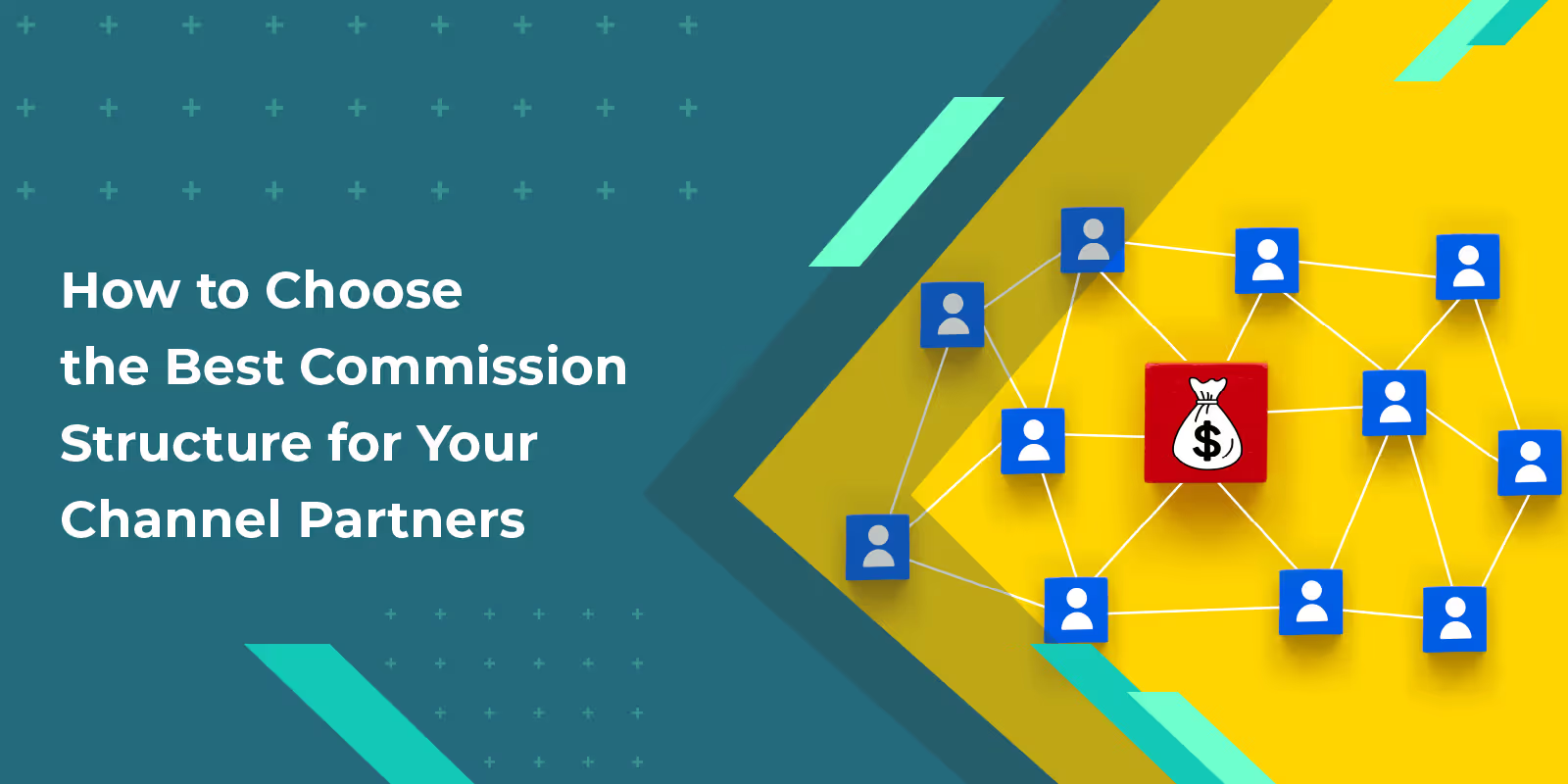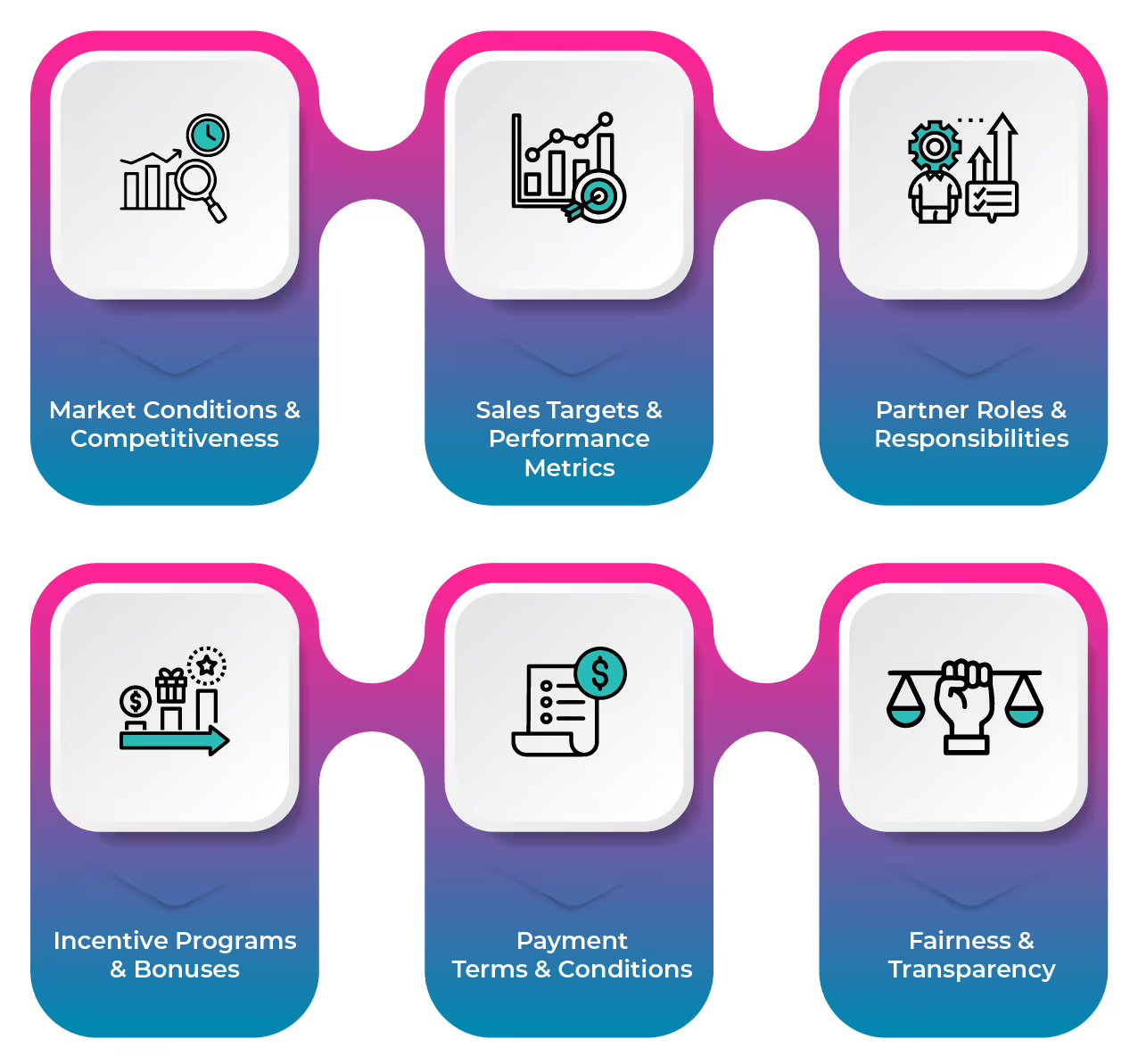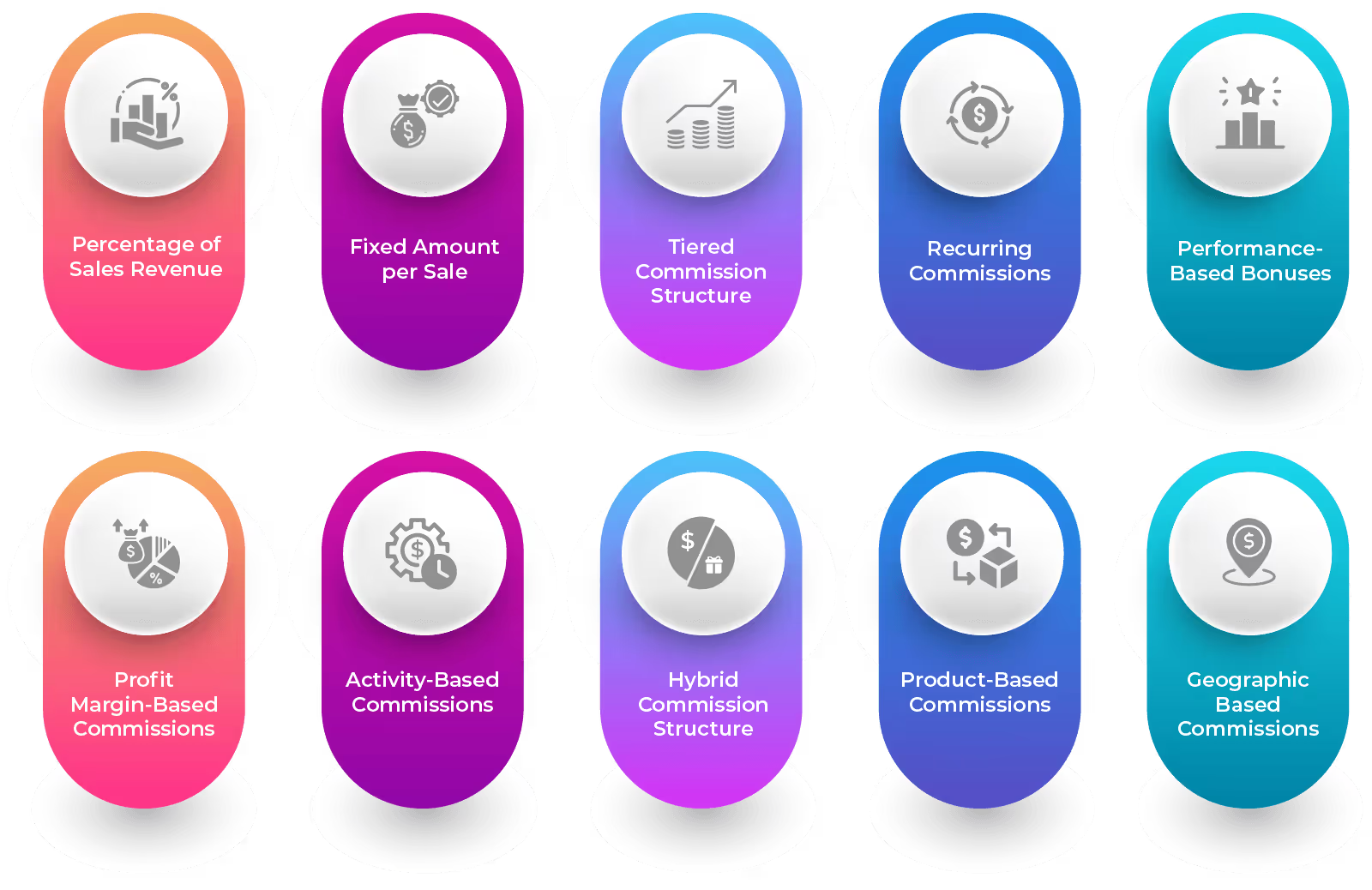
Blog
How to Choose the Best Commission Structure for Your Channel Partners
July 9, 2024


Key Insights
Every business works to expand its customer base at some point in its operations.
And we try to find the most cost-effective and efficient way of getting it done.
Surely, collaboration with channel partners has always been an effective choice.
These channel partners are your resellers, distributors, and partners who take your product to a wider customer base.
Undoubtedly, they deserve fair compensation for the efficient work that they accomplish.
So how do you go about finding the best commission structure for your channel partners?
Well, we have all the answers you need.
This article helps you understand channel partner commission structure, its importance, and key factors. We give examples of the top 10 commission types and best practices to enhance your channel partner strategy.
So without much ado, let's begin.
What are channel partner commissions?
Channel partners are individual or company collaborators who help sell or advertise your product or service. Their efforts as resellers, distributors, or partners help extend the reach of your sales efforts.
The commission made to these channel partners for their efforts and work is called the channel partner commission.
It is a mutually beneficial relationship. Your company can expand its reach without increasing your salesforce number. At the same time, the channel partners can benefit from the commission without having a product of their own.
Importance of a Well-Structured Commission Plan
If your company associates with a channel partner, then it's important that you build a well-structured commission plan.
To begin with, it motivates your channel partners. Incentives push them to promote and sell your products.
Fair compensation will ensure they prioritize you and invest more time and effort to boost your offering in the competitive landscape.
Well-structured commission structures come with a performance metric to track your partner's performance. This will help you understand their success rate in achieving sales and revenue goals.
Put the right amount of effort into building your commission structure and it will help you in future business growth.
As the business grows, a well-structured channel partner commission structure will easily be able to accommodate more partners seamlessly.
In the current market dynamics, a fair and competitive commission structure will attract top-performing channel partners to your business.
With the clear expectations that your commission structure provides they can easily achieve the desired results in no time.
In short, a well-structured channel partner incentive program provides transparency and clarity on how fair and competitive the commission is. This information helps foster strong relationships with your partners and drive growth and success.
Key Factors to Consider in Designing a Commission Structure
Channel partners go the extra mile to promote your products to a larger customer base.
Their efforts alone call for the requirement of a well-structured channel partner program. This means businesses must take into consideration some key factors while designing their commission structure.
Incorporating these key elements ensures that your commission structure not only meets but exceeds expectations.
So what are these factors that provide a competitive advantage to its beneficiaries?

Study the market conditions and competitiveness
Businesses must study the market landscape and understand what the industry standards are. This helps provide competitive and fair pay that attracts and retains your channel partners.
Define the sales targets and performance metrics
Define your sales targets and evaluation metrics for channel partners. This will help them understand what is expected of them and meet these expectations with timely accuracy.
Determine the partner roles and responsibilities
Clearly determine the roles and responsibilities of your channel partners. This will help in determining your commission rates and providing fair pay for their tasks and achievements.
Provide incentive programs and bonuses
Award due incentives and rewards for your channel partners for their achievements. Selling high-priority products or exceeding sales targets must be recognized with special bonuses.
Be clear about payment terms and conditions
Have clear communication on the payment terms and conditions. It must be made clear at what intervals and upon achieving what milestones will the partner start getting paid.
Ensure fairness and transparency in your commission
Provide fair and competitive pay to your channel partners. Be transparent when updates on the commission plan, performance metrics, and other commission reviews happen.
Designing a commission plan provides a clear path to monitor and track performance and payment for both the company and the channel partner.
Top 10 Commission Structure Types for Channel Partners
There are a variety of commission types out there.
The choice differs depending on your product, the industry, the competition, and even partner preference.
So here is a list of the top 10 types of SaaS channel partner commission structures for you to choose from:

Percentage of Sales Revenue
A straightforward commission structure where channel partners receive a percentage of the revenue from each sale they make.
Fixed Amount per Sale
Irrespective of the sales value or revenue generation, partners receive a fixed price for each sale they make.
Tiered Commission Structure
A competitive commission structure where partners have the opportunity to earn higher commission rates as they achieve higher milestones.
Recurring Commissions
In subscription-based models like SaaS, partners can earn ongoing commission as long as the customer contract is valid.
Performance-Based Bonuses
Channel partners can earn extra commissions as they achieve specific performance goals. This includes exceeding sales targets, selling high-priority products, acquiring new customers, etc.
Profit Margin-Based Commissions
Commissions are calculated as a percentage of the profit margin of the product. This will encourage parties to sell higher-margin products.
Activity-Based Commissions
Commission can be calculated based on the activities accomplished by the partner. This includes lead generation, customer acquisition, number of products sold, etc.
Hybrid Commission Structure
Your commission plan can be a combination of a variety of commission structures. For example, you can provide a fixed pay along with performance-based commission, tiered commission, recurring commission, etc.

Product-Based Commissions
Businesses can assign different commission rates to different products or services. Higher commission rates can be assigned to high-priority products to encourage partners to focus on promotion and selling.
Geographic Based Commissions
Depending on the market penetration or geographic region the commissions can change. Partners in hard-to-penetrate areas will be offered higher commissions to bring in sales and reach.
From the variety of options available, it depends on each individual business what best suits you.
Eventually, it all falls on your business objectives, the nature of your products, and other organizational goals.
Deciding Which Commission Plan is Right For Your Partnership Program
By now you know that there are a wide variety of commission plan options available for you.
Deciding on which is the right commission plan is a subjective choice.
It involves taking into consideration a long list of factors including your internal structure as well as your channel partners' preferences.
So here is a checklist for you while choosing the right channel partner incentive programs for your business:
✅Understand your business model
✅Determine your budget availability
✅Analyze industry best practices
✅Establish clear performance metrics
✅Assess partner engagement in the commission program
✅Seek feedback from channel partners
✅Make a pilot trial to see its impact
✅Review and make required changes to suit your operations
Evaluating your commission structure from a company objective perspective and channel partner requirement perspective will help strike a balance.
It will help in choosing the right commission types that drive your business goals without compromising on your partnership and their interests.
Best Practices for Commission Structure Implementation
Your channel partners are your greatest allies. Keeping them happy and satisfied is one of your top priorities.
So it's necessary that you include all possible best practices to make your commission structure perfect.
We have curated a list of the top 10 best practices that you can use during your commission structure implementation:
- Maintain clear communication with your channel partners. It helps ensure that they understand the specifics of the incentive program.
- Regularly evaluate the effectiveness of your commission structure. Be open to making adjustments based on performance data and partner feedback.
- Be transparent about your commission calculation and pay. In the occurrence of any discrepancies be accountable for addressing and resolving them.
- Define clear performance metrics. This helps channel partners understand what is expected of them and work towards achieving their targets.
- Use effective incentive plans and rewards that align with your channel partner's goals.
- Provide the required training and support to your channel partners. This will help them understand your product well and equip them to achieve the required goals.
- Always ask for your partner's feedback. Are they satisfied with the commission, what improvements can be made, what their expectations are etc?
- Leverage technological solutions to ease routine commission tasks. Kennect can automate your entire sales incentives process to save time and ensure accuracy.
- Ensure timely commission payouts and streamline the payment process for ease of receipt.
Making these practices a part of your everyday routine will enhance the trust of your channel partners, the effectiveness of your commission structure, and your overall channel incentive management.
How Does Partner Incentive Structure Work?
Partnership works on the simple principle of mutual benefit.
While one party puts their effort, strategies, and tactics to achieve the goals and objectives of the other the latter pays back monetarily.
For example, in a channel partnership, the reseller or distributor helps you reach a larger customer base without increasing your sales force. In return, your business compensates them with fair and competitive pay.
Though this is the basic working principle, businesses cannot just stay happy with the basics.
To make your incentive structure work, you need to add more ingredients to it.
For transparency, include performance metrics.
For performance, include special bonuses and rewards.
For loyalty, ensure a clear understanding of the incentive program and timely payout.
In short, your incentive program must have components that motivate your channel partner to help achieve your company goals and objectives.
When your incentive program pushes your channel partner to perform and exceed performance, then it can be said that your partner incentive structure works.
Key Takeaways
Channel partnership is a cost-effective way of widening your customer base.
They are the resellers, distributors, and partners who take your product or service to newer customers, newer markets, newer regions, and geographical locations.
For the strategic work they do, it is important to provide them a fair and competitive pay.
That is why designing, building, and implementing an effective channel partner program is necessary.
For this, you need to study the market trends, determine metrics for objective evaluation, educate your channel partners about its specifics, and ensure timely and easy payout.
With channel partners spread across the country, manually tracking their work and progress becomes a tedious task.
Opting for a simple solution as automation can solve all your channel partner management issues- from performance management to incentive management.
With Kennect’s cutting-edge solution, we automate your entire incentives process, saving you time and ensuring accuracy. Remove the hassle of spreadsheets and manual errors.
Kennect provides efficiency. For more information Book A Demo with us.
ReKennect : Stay ahead of the curve!
Subscribe to our bi-weekly newsletter packed with latest trends and insights on incentives.
Thank you! Your submission has been received!
Oops! Something went wrong while submitting the form.
Your data is in safe hands. Check out our Privacy policy for more info















